英语人教版七年级上册学习使用描述性形容词:interesting,boring
人教版-英语-七上-5单元 教材精解
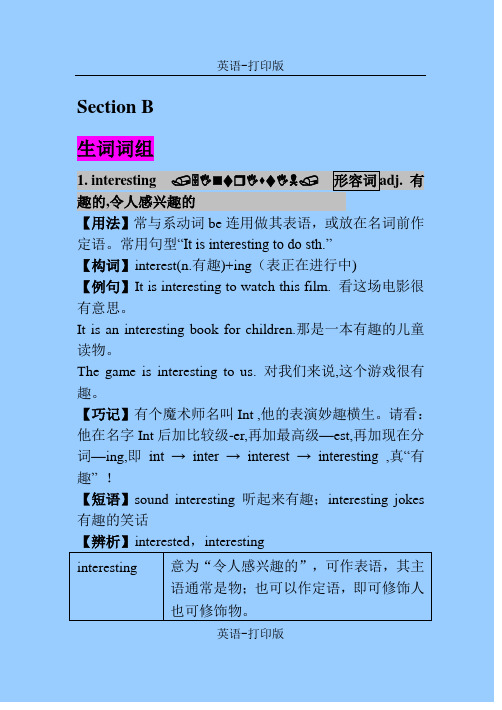
Section B生词词组1. interesting 形容词adj. 有趣的,令人感兴趣的【用法】常与系动词be连用做其表语,或放在名词前作定语。
常用句型“It is interesting to do sth.”【构词】interest(n.有趣)+ing(表正在进行中)【例句】It is interesting to watch this film. 看这场电影很有意思。
It is an interesting book for children.那是一本有趣的儿童读物。
The game is interesting to us. 对我们来说,这个游戏很有趣。
【巧记】有个魔术师名叫Int ,他的表演妙趣横生。
请看:他在名字Int后加比较级-er,再加最高级—est,再加现在分词—ing,即int → inter → interest → interesting ,真“有趣” !【短语】sound interesting 听起来有趣;interesting jokes 有趣的笑话【辨析】interested,interestinginteresting 意为“令人感兴趣的”,可作表语,其主语通常是物;也可以作定语,即可修饰人也可修饰物。
英语-打印版Interested 意为“感兴趣的”,常用于“be/becomeinterested in”这一结构,主语通常是人。
2. boring 形容词adj. 无聊的;令人生厌的【用法】作形容词,意为“令人生厌的”。
在句中,主语常常是物或事情,在句中作表语或定语。
【例句】The film is boring。
这部电影很无聊。
It is boring to talk with him. 和他谈话简直太乏味了。
【短语】a boring film 一部让人讨厌的电影【辨析】boring 与bored 的区别boring为形容词,意为“无聊的,令人厌烦的,令人讨厌的”,指事物本身的特征或性质,常用物做主语。
人教版七年级英语上册知识点归纳
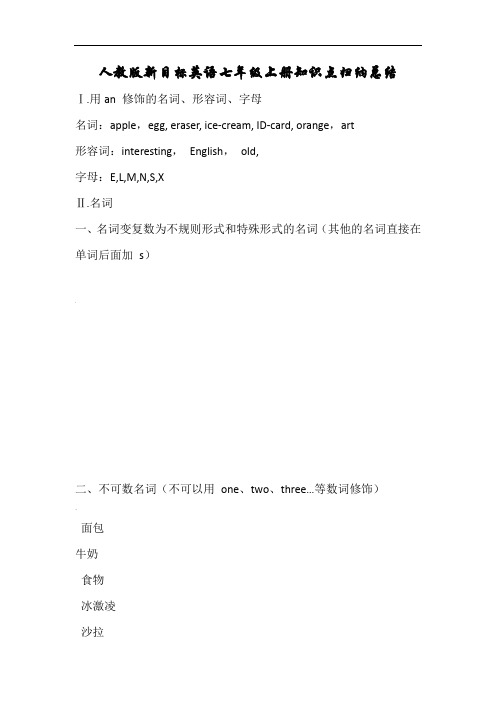
人教版新目标英语七年级上册知识点归纳总结Ⅰ.用an 修饰的名词、形容词、字母名词:apple,egg, eraser, ice-cream, ID-card, orange,art形容词:interesting,English,old,字母:E,L,M,N,S,XⅡ.名词一、名词变复数为不规则形式和特殊形式的名词(其他的名词直接在单词后面加s),二、不可数名词(不可以用one、two、three…等数词修饰)、面包牛奶食物冰激凌沙拉鸡肉Ⅲ.疑问句一、一般疑问句及其答语,1. - Is he Jack –Yes , he is.\ No, he isn’t. His name’s Mike you Helen –Yes, I am\ No, it isn’t. I’m Gina.3. -Is this\that your pencil –Yes, it is .\No, it isn’t. It’s hers. these\those your books -Yes, they are.\No, they aren’t. They’re mine you have a soccer ball –Yes, I do\ No, I don’t.she have a basketball –Yes ,she does.\ No, she does n’tyou like bananas –Yes ,I do.\No. I don’t.she like tomatoes – Yes, she does\No, she doesn’t二、…三、特殊疑问句及其答语’s this\that in English –It’s\It is …color is it –It’s\It is …his \her name –He’s Eric\She’s Mary.’s she –she is…’re\Who are they –They’re…’s my schoolbag –It’s on\under\in …are their keys –They’re on\in\under …#much is the hat –It’s five dollars.much are these socks –They’re two dollars.is your birthday –My birthday is on\in… I t’s on\in…’s Mary’s favorite subject –Her favorite subject is science.does Bob like history -Because it’s interesting.do Frank and Bob like . –Because it’s fun.is your music teacher –My music teacher is …Ⅳ.物主代词(名词性物主代词,形容词性物主代词)一、/二、名词性物主代词:mine, yours, his, hers, theirs,ours.(这些词后面没有名词)三、形容词性物主代词:my, your, his, her,their,our.(这些词后面一定有名词)Ⅴ.词组和固定搭配pair of 一双,一对set of 一套,一串,一副…for…请求,恳求(给予)I help you (我能帮助您吗)on.(快点!加油!)name (名字)name(姓)sure(无疑,肯定)…to… (从…到…)a good day!=have a good time!过得愉快~you are 给你about…=What about……怎么样much is\are……多少钱old is\are……几岁English 用英语school 中学you!再见~you for…为…而感谢你about…考虑,思考TV 看电视’re welcome 别客气~is\are +名词单数\名词复数这是\这些是the first photo 在第一张相片里the next picture 在下一张照片里name of …=one’s name…的名字+动词原形必须做某事sb at +邮箱地址发邮件给某人sb. 给某人打电话Call+ 号码拨打某号码call sb at + 号码给某人打电话拨某号码sth. with sb. 和某人玩…sb. about sth. 询问某人关于某事.+in+颜色=颜色+n.某种颜色的某物busy with\doing sth.忙某事\忙于做某事trip 学校郊游festival 艺术节a great sale大减价.a good price 以合理的价格class\school 课下\放学后Ⅵ.同义句1.how much is \are…= what’s the price of…2.What’s one’s favorite subject= what subject do\does best(。
Unit 5 单元知识速记 -2024-2025学年七年级上册英语核心知识归纳精练一遍过(人教新目标

Unit 5单元知识速记词汇精讲1.interesting&interested这两个词都是形容词。
interesting表示某物本身有趣,强调主动,在句子中可以作定语、表语,多用来修饰物。
interested着重于被动意义,其主语一般是人。
常做表语,后接介词in,一起构成be interested in…结构,意为“对……感兴趣”。
例如: I am very interested in the interesting story. 我对这个有趣的故事很感兴趣。
2.difficultdifficult“困难的”,相当于hard。
在句子中可作定语或者表语。
其反义词是easy“容易的”。
其名词形式是difficulty。
常用于以下结构:It’s difficult for sb. to do sth. (对某人来说做某事很困难。
)例如:It’s difficult for me to listen to you clearly. 对我来说听清楚你说话很难。
3.greatgreat 形容词,意为“美妙的,大的,伟大的”。
例如:That’s great! 太好了!He’s a great man. 他是个伟大的人。
4.watchwatch作动词时,意为“看”。
一般指看动态的东西,例如:节目、比赛等。
动词短语“看电视”用“watch TV”。
watch 还可以指认真观察,或者目睹事情的全过程。
例如:I watched my son become from a baby to a boy.我看到我的儿子从婴儿变成了男孩儿。
Just watch what will happen when I press the button.看着, 我按按钮会发生什么事情。
watch 还可以作名词,意为“手表”。
例如:My father bought me a new watch. 我爸爸给我买了块新表。
注意:watch与see,look,read的区别look意为“看”,指看的动作。
七年级下册英语重点单词用法归纳
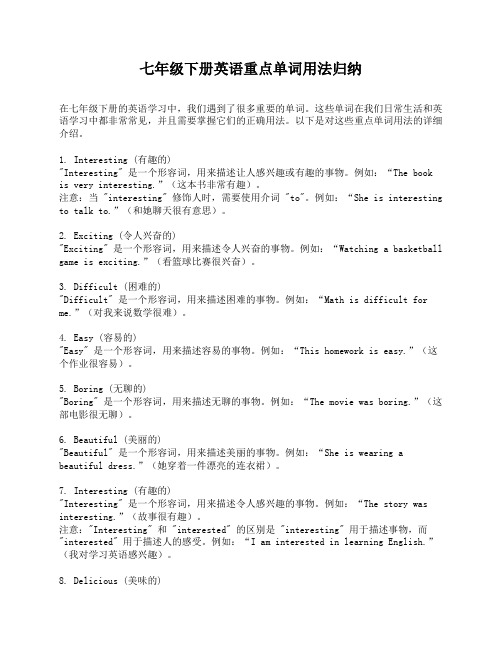
七年级下册英语重点单词用法归纳在七年级下册的英语学习中,我们遇到了很多重要的单词。
这些单词在我们日常生活和英语学习中都非常常见,并且需要掌握它们的正确用法。
以下是对这些重点单词用法的详细介绍。
1. Interesting (有趣的)"Interesting" 是一个形容词,用来描述让人感兴趣或有趣的事物。
例如:“The book is very interesting.”(这本书非常有趣)。
注意:当 "interesting" 修饰人时,需要使用介词 "to"。
例如:“She is interesting to talk to.”(和她聊天很有意思)。
2. Exciting (令人兴奋的)"Exciting" 是一个形容词,用来描述令人兴奋的事物。
例如:“Watching a basketball game is exciting.”(看篮球比赛很兴奋)。
3. Difficult (困难的)"Difficult" 是一个形容词,用来描述困难的事物。
例如:“Math is difficult for me.”(对我来说数学很难)。
4. Easy (容易的)"Easy" 是一个形容词,用来描述容易的事物。
例如:“This homework is easy.”(这个作业很容易)。
5. Boring (无聊的)"Boring" 是一个形容词,用来描述无聊的事物。
例如:“The movie was boring.”(这部电影很无聊)。
6. Beautiful (美丽的)"Beautiful" 是一个形容词,用来描述美丽的事物。
例如:“She is wearing a beautiful dress.”(她穿着一件漂亮的连衣裙)。
7. Interesting (有趣的)"Interesting" 是一个形容词,用来描述令人感兴趣的事物。
人教版七年级英语上册期末复习:Units5-9_词汇句型精讲精练
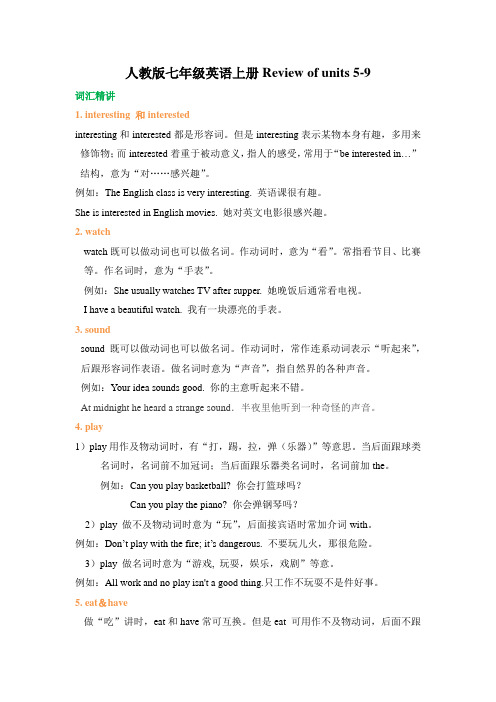
人教版七年级英语上册Review of units 5-9词汇精讲1. interesting 和interestedinteresting和interested都是形容词。
但是interesting表示某物本身有趣,多用来修饰物;而interested着重于被动意义,指人的感受,常用于“be interested in…”结构,意为“对……感兴趣”。
例如:The English class is very interesting. 英语课很有趣。
She is interested in English movies. 她对英文电影很感兴趣。
2. watchwatch既可以做动词也可以做名词。
作动词时,意为“看”。
常指看节目、比赛等。
作名词时,意为“手表”。
例如:She usually watches TV after supper. 她晚饭后通常看电视。
I have a beautiful watch. 我有一块漂亮的手表。
3. soundsound既可以做动词也可以做名词。
作动词时,常作连系动词表示“听起来”,后跟形容词作表语。
做名词时意为“声音”,指自然界的各种声音。
例如:Your idea sounds good. 你的主意听起来不错。
At midnight he heard a strange sound.半夜里他听到一种奇怪的声音。
4. play1)play用作及物动词时,有“打,踢,拉,弹(乐器)”等意思。
当后面跟球类名词时,名词前不加冠词;当后面跟乐器类名词时,名词前加the。
例如:Can you play basketball? 你会打篮球吗?Can you play the piano? 你会弹钢琴吗?2)play 做不及物动词时意为“玩”,后面接宾语时常加介词with。
例如:Don’t play with the fire; it’s dangerous. 不要玩儿火,那很危险。
初中英语新人教版七年级上册Unit4Section B课文讲解(2024秋)

七年级英语上册Unit4 SB课文讲解1.I’m a student in Canada. 我是加拿大的学生。
【用法详解】In Canada在此处作后置定语修饰前面的student,译为“加拿大的学生”。
“In + 国家”表示“在某个国家”Eg: in China 在中国; in America 在美国【知识拓展】作后置定语的五种形式(1)形容词作后置定语: Eg: the girl asleep 正在熟睡的女孩(2)副词作后置定语: Eg: students here 这的学生(3)介词短语作后置定语 Eg: the man with glasses 戴眼镜的人(4)动词不定式作后置定语 Eg: the key to success 成功的关键(5)分词作后置定语 Eg: the girl sitting next to me 坐在我旁边的女孩【即学即用】( B )1.The girl _______ England is our new classmate.A.is fromB.fromes fromD.are from2.I’m very busy this year. 我今年很忙。
【用法详解】busy为形容词,译为“繁忙的;忙碌的”,在句中常作定语或表语。
常见搭配:be busy with sth.= be busy doing sth. 忙于做某事Eg: My mum is busy with dinner.= My mum is busy cooking dinner. 我妈妈正忙着做晚饭。
【知识拓展】Busy反义词为free,译为“空闲的”,free也可译为“免费的;自由的”等。
Eg: I’m free today. 我今天有空。
The cake is free. 这块蛋糕是免费的。
This is a free country. 这是一个自由的国家。
【即学即用】( B )1.The students are busy _______ for the coming exam.A.prepareB.preparingC.to prepareD.to preparing.3.He lets us play all kinds of interesting instruments. 他让我们演奏各种各样有趣的乐器。
(完整版)人教版初中英语各单元形容词知识点汇总表
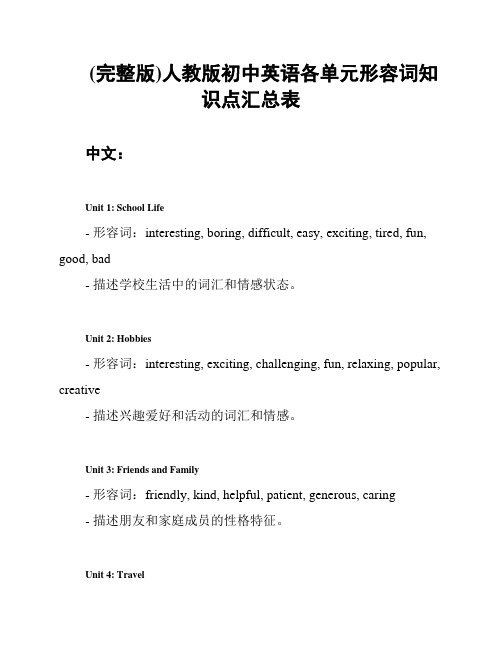
(完整版)人教版初中英语各单元形容词知识点汇总表中文:Unit 1: School Life- 形容词:interesting, boring, difficult, easy, exciting, tired, fun, good, bad- 描述学校生活中的词汇和情感状态。
Unit 2: Hobbies- 形容词:interesting, exciting, challenging, fun, relaxing, popular, creative- 描述兴趣爱好和活动的词汇和情感。
Unit 3: Friends and Family- 形容词:friendly, kind, helpful, patient, generous, caring- 描述朋友和家庭成员的性格特征。
Unit 4: Travel- 形容词:beautiful, stunning, amazing, breathtaking, crowded, peaceful, memorable- 描述旅行目的地和景点的词汇和情感。
Unit 5: Food and Health- 形容词:delicious, healthy, tasty, fresh, nutritious, spicy, sweet, salty- 描述食物和健康的词汇和情感。
Unit 6: Environment- 形容词:clean, polluted, green, beautiful, natural, crowded, peaceful, noisy- 描述环境和地区的词汇和情感。
Unit 7: Daily Routine- 形容词:busy, productive, tiring, relaxing, regular, organized- 描述日常生活和活动的词汇和情感。
Unit 8: Festivals and Celebrations- 形容词:joyful, festive, exciting, cultural, traditional, meaningful, colorful- 描述节日和庆典的词汇和情感。
最新人教版七年级英语上册单词、音标、词性、词义
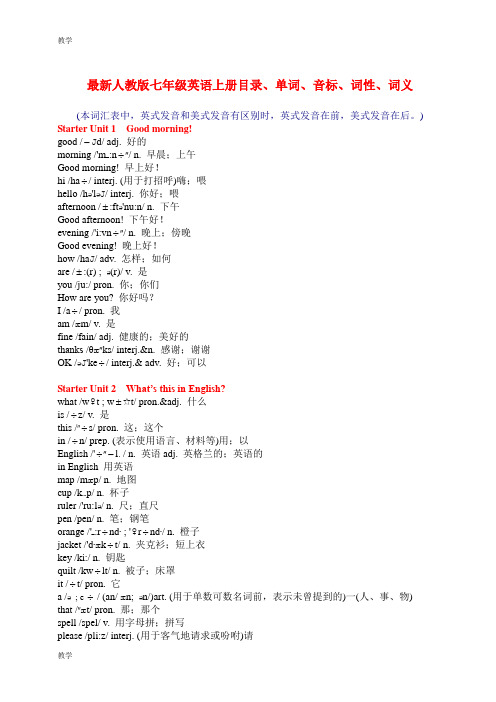
最新人教版七年级英语上册目录、单词、音标、词性、词义(本词汇表中,英式发音和美式发音有区别时,英式发音在前,美式发音在后。
) Starter Unit 1 Good morning!good / J d/ adj. 好的morning /'m :n / n. 早晨;上午Good morning! 早上好!hi /ha / interj. (用于打招呼)嗨;喂hello /hə'ləJ/ interj. 你好;喂afternoon / :ftə'nu:n/ n. 下午Good afternoon! 下午好!evening /'i:vn / n. 晚上;傍晚Good evening! 晚上好!how /ha J/ adv. 怎样;如何are / :(r) ; ə(r)/ v. 是you /ju:/ pron. 你;你们How are you? 你好吗?I /a / pron. 我am /æm/ v. 是fine /fain/ adj. 健康的;美好的thanks /θæ ks/ interj.&n. 感谢;谢谢OK /əJ'ke / interj.& adv. 好;可以Starter Unit 2 What’s this in English?what /w t ; w t/ pron.&adj. 什么is / z/ v. 是this / s/ pron. 这;这个in / n/ prep. (表示使用语言、材料等)用;以English /' l / n. 英语adj. 英格兰的;英语的in English 用英语map /mæp/ n. 地图cup /k p/ n. 杯子ruler /'ru:lə/ n. 尺;直尺pen /pen/ n. 笔;钢笔orange /' :r nd ; ' r nd / n. 橙子jacket /'d æk t/ n. 夹克衫;短上衣key /ki:/ n. 钥匙quilt /kw lt/ n. 被子;床罩it / t/ pron. 它a /ə; e / (an/ æn; ən/)art. (用于单数可数名词前,表示未曾提到的)一(人、事、物) that / æt/ pron. 那;那个spell /spel/ v. 用字母拼;拼写please /pli:z/ interj. (用于客气地请求或吩咐)请Starter Unit 3 What color is it?color /'k lə/ n. (=colour) 颜色red /red/ adj.& n. 红色(的)yellow /'jeləJ/ adj.& n. 黄色(的)green / ri:n/ adj.& n. 绿色(的)blue /blu:/ adj.& n. 蓝色(的)black /blæk/ adj.& n. 黑色(的)white /wa t/ adj.& n. 白色(的)purple /'p3:pl/ adj.& n. 紫色(的)brown /bra J n/ adj.& n. 棕色(的);褐色(的)the / ; ə/ art. 指已提到或易领会到的人或事物now /na J/ adv. 现在;目前see /si:/ v. 理解;明白can /kæn;kən/ modal v. 能;会say /se / v. 说;讲my /ma / pron. 我的Unit 1 My name’s Gina.name /ne m/ n. 名字;名称nice /na s/ adj. 令人愉快的;宜人的to /tu:tə/常用于原形动词之前,表示该动词为不定式meet /mi:t/ v. 遇见;相逢too /tu:/ adv. 也;又;太your /j :/ pron. 你的;你们的Ms. /m z/ (用于女子的姓氏或姓名前,不指明婚否)女士his /h z/ pron. 他的and /ænd ; ənd/ conj. 和;又;而her /h3:(r)/ pron, 她的yes /jes/ interj. 是的;可以she / i:/ pron. 她he /hi:/ pron. 他no /nəJ/ interj. 不;没有;不是not /n t ; n t/ adv. 不;没有zero /'z ərəJ ; 'z rəJ/ num. 零one /w n/ num. 一two /tu:/ num. 二three /θri:/ num. 三four /f :/ num. 四five /fa v/ num. 五six /s ks/ num. 六seven /'sevn/ num. 七eight /e t/ num. 八nine /na n/ num. 九telephone /'tel fəJ n/ n. 电话;电话机number /'n mbə/ n. 号码;数字phone /fəJ n/ n. 电话;电话机telephone/phone number 电话号码first /f3:st/ adj. 第一first name 名字last /l :st ; læst/ adj. 最后的;末尾的last name 姓friend /frend/ n. 朋友China /'t a nə/ 中国middle /'m dl/ adj. 中间的;中间school /sku:l/ n. 学校middle school 中学;初中Unit 2 This is my sister.sister /'s stə/ n. 姐;妹mother /'m ə/ n. 母亲;妈妈father /'fa: ə/ n. 父亲;爸爸parent /'peərənt/ n. 父(母)亲brother /'br ə/ n. 兄;弟grandmother /' rænm ə/ n. (外)祖母;奶奶;外婆;姥姥grandfather /' rænf : ə/ n. (外)祖父;爷爷;外公;姥爷grandparent /' rænpeərənt/ n. 祖父(母);外祖父(母)family /'fæməli/ n. 家;家庭those / əJ z/ pron. 那些who /hu:/ pron. 谁;什么人oh /əJ/ interj. 哦;啊these / i:z/ pron. 这些they / e / pron. 他(她、它)们well /wel/ interj. 嗯;好吧have /hæv/ v. 经受;经历day /de / n.一天;一日;白天Have a good day! (表示祝愿)过得愉快!bye /ba / interj. (=goodbye)再见son /s n/ n. 儿子cousin /'k zn/ n. 堂兄(弟、姊、妹);表兄(弟、姊、妹)grandpa /' rænp :/ n. (外)祖父;爷爷;外公;姥爷mom /m m/, /m :m/ n. (=mum)妈妈aunt / :nt ; nt/ n. 姑母;姨母;伯母;婶母;舅母grandma /' rænm :/ n.(外)祖母;奶奶;外婆;姥姥dad /dæd/ n. 爸爸uncle /' kl/ n. 舅父;叔父;伯父;姑父;舅父daughter /'d :tə/ n. 女儿here /h ə/ adv. (用以介绍某人或某物)这就是;在这里photo /'fəJ təJ/ n. 照片of / v, əv/ prep. 属于(某人或某物);关于(某人或某物) next /nekst/ adj.&n. 下一个(的);接下来(的)picture /'p kt ə/ n. 照片;图画girl / 3:l/ n. 女孩dog /d ; d :g/ n. 狗Unit 3 Is this your pencil?pencil /'pensl/ n. 铅笔book /b J k/ n. 书eraser / 're zə/ n. 橡皮box /b ks ; b ks/ n. 箱;盒pencil box 铅笔盒;文具盒schoolbag /'sku:lb / n. 书包dictionary /'d k ənri ; 'd k əneri/ n. 词典;字典his /h z/ pron. 他的mine /ma n/ pron. 我的hers /h3:z/ pron. 她的excuse / k'skju:z/ v. 原谅;宽恕me /mi:/ pron. (I的宾格)我excuse me 劳驾;请原谅thank /θæ k/ v. 感谢;谢谢teacher /'ti:t ə(r)/ n. 老师;教师about //ə'ba J t/ prep. 关于What about...?(询问消息或提出建议)......怎么样?......好吗?yours /j :z/ pron. 你的;你们的for /f :(r) ; /fə(r) / prep. 为了;给;对thank you for... 为......而感谢help /help/ v.&n. 帮助;援助welcome /'welkəm/ adj. 受欢迎的You're welcome. 别客气。
新人教版新人教版英语七年级上册Unit5—9单元知识要点解析

新人教版新人教版英语七年级上册Unit5—9单元知识要点解析知识考点:1.英语“有”的表达:have ,has ,there be 的区别。
have ,has ,there be 三者都有“有”的意思。
但have ,has 指某人/某物拥有/占有,其陈述句为Sb.+have/has+sth.而there be指某地/某时存有有,其陈述句为There be +主语(某人/某物)+时间/地点。
eg. I have a pen. He has a pencil.There is some milk in the glass.2.Let’s + 动词原形.这是一个let开头的祈使句,表示建议。
Let’s是let us的缩略形式。
特别要注意Let’s后必须跟动词原形。
肯定回答可用OK/All right/Certainly/Good idea/That sounds + adj. 否定回答可用Sorry,I…eg:—Let’s go to the park. 咱们去公园吧。
—Good idea 好主意。
3. interesting/interestedinteresting/interested 两者都是形容词,前者指“物”,意为“有趣的,令人感兴趣的”,放在名词前做定语或be后做表语;后者指“人”,意为“感兴趣的”。
类似用法的词如:relaxing /relaxed; boring/bored; exciting/excitedeg:This is an interesting book . 这是一本有趣的书。
This book is very interesting.He is interested in TV.他对电视很感兴趣。
4. watch,see,lookwatch “观看,欣赏,注视”,常用于看电视、看比赛。
We sat there watching a basketball game. 我们坐在那看篮球比赛。
(人教版)2024七上U4单词讲解

6.past n.过去;过去的事情 in the past在过去
adj.过去的
in past years 过去的岁月
pr.
现在是五点十分。
7. number n.数字;号码 The number of students in my class is 45. My phone number is 7342001. (提问)
As students,we should work hard. 作为学生,我们应该努力学习。
They were dressed as doctors. 他们打扮成医生。 conj.当……时;由于
I was watching TV as she ran in.她进来时我正在看电视。 He may need some help as he’s new here.由于他是新来的
10. reason n.原因;理由 the reason of PK the cause of (注意介词的搭配) I don’t know the reason why you're late. 我不明白你为什么迟到的原因。 He gave no reason for that. 那件事没有给出理由。 11.listen to 听;倾听 (listen-listens-listened-listening) He often listens to music. You should listen to your teacher carefully in class.
注意:be good at 擅长... My father is good at his job. be good for对...有益 Walking is good for our health.
人教版英语七年级上册期末高频考点专题突破Unit5 SectionB

Unit5 SectionB知识讲解Point 1 以-ing结尾的形容词许多形容词以-ing结尾,它们往往都可以变成以-ed结尾的形容词。
interesting有趣的➝interested感兴趣的boring枯燥乏味的,无聊的➝bored无聊的relaxing轻松的,令人放松的➝relaxed轻松,放松的Point 2 play的用法play的意思是"玩,打,进行(音乐、体育活动等)"。
"play + 球类运动或游戏等词"表示"打……球、玩……游戏"。
这种用法里,表示球类运动或游戏的名词之前不用冠词the或a/an。
Point 3 I don’t have a soccer ball, but my brother Alan does. 我没有足球,但是我的弟弟艾伦有。
此句完整的表述方式是:I don’t have a soccer ball,but my brother Alan has a soccer ball.为了避免重复,此处用does代替has a soccer ball,这种用do或does代替动词(词组)回答问题的用法非常常见。
does用于第三人称的单数的句子中。
Point 4 for me对我来说for是介词,后接代词宾格、名词或动词-ing形式。
专题练习一、单项选择1.—Are those pencils ________? I found ________ under the desk.—Yes,thank you.A.your;they B.your;them C.your;they D.yours;them 2.— Do you know the children over there?— Yes. ________ Mike and Jack.A.They B.Their C.Them D.They’re 3.The trousers are cheap. Can I ________?A.try it on B.try them on C.try on them D.try on it 4.When you are in a new place, try to be nice to others and make more ________. A.friends B.fun C.sentences D.trouble5.That sounds ________.A.well B.badly C.good D.fine二、完型填空Do you like sports? Do you 6 tennis, basketball or baseball 7 school?I’m Alex, and my 8 name is Green. 9 kids are in my family. We all like sports. My brother Ian and I are in the 10 class, so we play basketball and soccer together. Ian is tall and strong, so it’s 11 for him to play basketball well. But for me, it’s very difficult.I also 12 a sister and she is only nine years old. She likes ping-pong, so we always play ping-pong after school, and we have lots of 13 playing ping-pong. I think it’s relaxing to play 14 .In the evening, we can 15 some sports games on TV. I love sports and I’m happy.6.A.find B.play C.spell7.A.at B.on C.to8.A.first B.last C.middle9.A.Two B.Three C.Four10.A.great B.nice C.same 11.A.difficult B.easy C.interesting 12.A.have B.like C.see13.A.balls B.fun C.games 14.A.computers B.numbers C.sports 15.A.meet B.thank C.watch三、阅读单选16.We can ________ on Friday night.A.see a movie B.watch a basketball gameC.give books to the library D.come to the Art Festival17.If we want to watch different programs, we may go to the school hall ________. A.on Friday B.on Saturday C.tomorrow afternoon D.on weekdays 18.There will be a basketball game between ________ and ________ at 4:30 p. m. tomorrow.A.our school; No. 1 High School B.No. 1 High School; No. 3 High School C.our school; No. 3 High School D.our school; No. 3 Middle School 19.We can give old books to the library ________.A.at nine a.m. on Sunday B.at six p.m. on MondayC.at 10:00 p.m. on Friday D.at 11:00 a.m. on Friday20.Which of the following is NOT true?A.The basketball game is between our school and No. 2 High School.B.We can go to the movies at 8:00 p. m. on Friday.C.Our friends can come to the Art Festival with us.D.On Monday, we can give old newspapers and magazines to the library.四、用所给单词的正确形式填空21.Let ________ (we) play soccer.22.Show ________ (they) the pictures, please.23.Some fun facts about the world are very ______(interest).24.—Do you like bananas?—No, I don’t like ________ (it) at all.25.Mrs. Harris is a great mom. She takes good care of her three ________ (child) and she really loves ________ (they).五、完成句子26.我们和我们的朋友一起在学校踢球。
5.【新教材完结】2024新教材七上Unit4单词讲义+(学生版)

2024新教材七年级上册Unit4单词讲义1.boring[ˈbɔːrɪŋ] adj.乏味的,令人生厌的It is boring to listen to the same story. 听相同的故事是令人厌烦的. The movie is boring. 这部电影是乏味的。
➢汉译英:Ella 不喜欢历史,因为它是乏味的。
➢辨析形容词:boring /bored●"bored" 通常用来形容人,强调的是人的内心感受。
例如,“He felt bored during the long meeting.”(他在冗长的会议中感到厌倦。
)●"boring" 则可以用来形容人或事物,但更多的是用来形容事物。
例如,“Her speech was boring and lacked energy.”➢趁热打铁:Peter is so _______ at such a ______ book.A. bore; boreB. boring; boringC. bored; boringD. boring; bored2. useful/ ˈjuːsf(ə)l /adj.有用的,有益的My mobile phone is very useful.我的手机很有用。
➢填空:这是一本有用的书:This is .➢词性转换:use/ juːz /v.用,使用useless/ ˈjuːsləs /adj.无用的Can I use your bike, please? 我可以用一下你的自行车么吗?This pen is useless. 这支笔没用了。
3.exciting/ ɪkˈsaɪtɪŋ /adj.令人兴奋的,令人激动的;Every day was exciting and adventuresome.过去的每一天都令人兴奋充满惊险和刺激。
He told me all the news but none of it was very exciting.他告诉了我所有的新闻,但没有一件激动人心的。
人教版七年级上册Unit 4 My Favourite Subject知识点
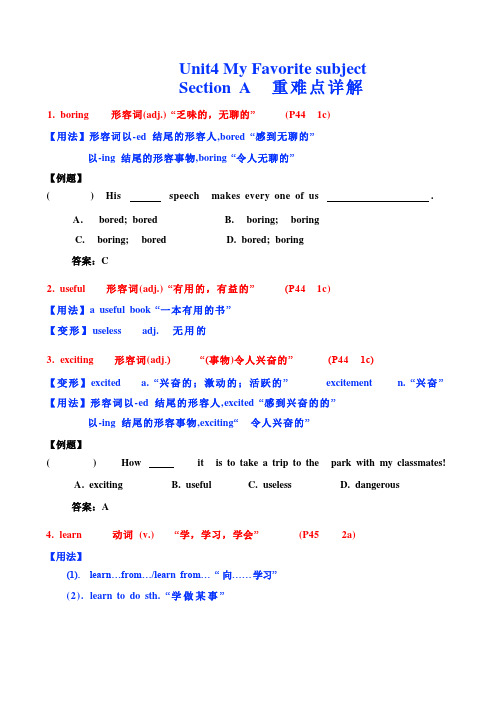
Section A1. boring (P44 1c)( ) His speech makes every one of us .A.bored; boredB. boring; boringC. boring; boredD. bored; boringC2. useful (P441c)a useful bookuseless adj.3. exciting .) (P44 1c)excited a. excitement n.“( ) How it is to take a trip to the park with my classmates!A. excitingB. usefulC. uselessD. dangerousA4. learn (v.) (P45 2a)(1). learn…from…/lea rn from…“(2). learn to do sth. ”(3). learn about “”(4). learn by oneself =teach oneself “learn & study5. past (P45 2a)(adv.)(prep.)(1). in the past few weeks(2). in the past(3). half past seven ” (4). go/walk past=pass ”6. good(P45 2a)be good at/for/to/with() Doing eye exercisesisyour health.A. good toB. good oC. goodat D. good forD7. help&(P45 2a)(1)ask for help ”need some help “”with one ’s help =with the help of(2)help sb. (to) do sth. ”help sb. with sth. ”help oneself to sth.…”help (sb.) out( ) 1. —Are you feeling any better now?—No. I have taken some medicine, but it just d oesn’t .A. useB. careC. helpD. fitC( ) 2. Would you my Chemistry? Yes, I’d love to.A. help forB. help inC. help withD. help toC8. listen “(P47 3b)(1). listen to sb. /sth. “. . . . . .”(2). listenListen! They are watching the TV show. ”( ) 1. Listen! Our teacher in the music classroom .A. singsB. sangC. will singD. is singingD( ) 2. —Jim, could you please answer the question?—Sorry, I . Could you say it again?A.wasn’t listeningB. don’t listenC. am not listeningD. won’t listenA9. remember (P473c)(1) remember to do(2) remember doing( ) 1. Remember me when you arrive!A. callB. to callC. callingD. calledB( ) 2. Why is the letter still here? I remember it yesterday.A. postB. to postingC. postingD. postedCSection B1. French .) (P48 1b)Frenchman p l. Frenchmen)2. future (P48 1b)in the future3. work (P48 1b)(1). work hard = be hard-working ”(2). work on(3).work for ......”(4). work out e.g. work it out(5). at work ”( ) 1. My aunt is working a teacher.A. asB. forC.D. outA2.My uncle has worked really hard,so he succeeded at last.My uncle succeeded at last because of his.hard work4. life p l. lives) (P48 1b)(1). save one ’s life”(2). in one ’s life”(3). lead/live a happy life语法聚焦a nd,but becauseI..( ) 1. It’s hard fo r us to say goodbye we have somany happy daysto remember.A. soB. becauseC. althoD. butB( ) 2. I like dancing, I don’t have enough time to practice it.A. orB. soC. butD. becauseC( ) 3. Chen Wei isn’t at school today he is taking a robot competitionin Shanghai.A. soB. becauseC. beforeD. ifBin, on a t(1) atat :at six twenty,at midnight,at the moment(2) ina. : in 2017, in May, inspring, in themorning/afternoon/evening, in ten yearsb. They will come back in aweek.(3) ona. on Monday ,on May 4thb. morning, afternoon, evening, night on the morning of July 6on a rainy morning, on Tuesday morning, on a cold night。
英语人教版七年级上册学习使用描述性形容词:interesting,boring
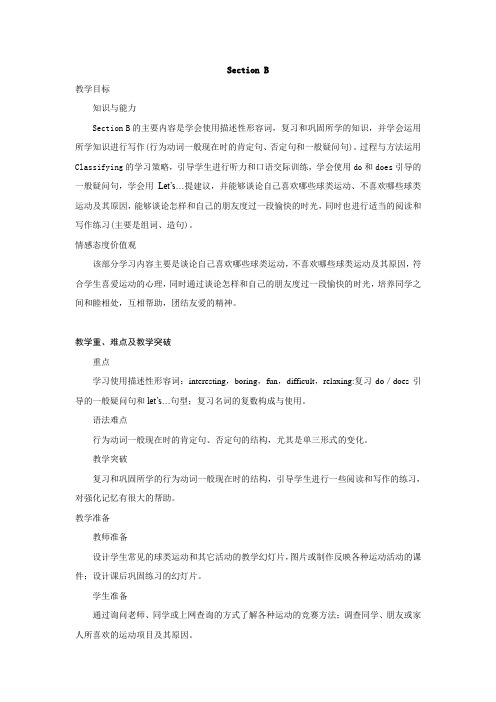
Section B教学目标知识与能力Section B的主要内容是学会使用描述性形容词,复习和巩固所学的知识,并学会运用所学知识进行写作(行为动词一般现在时的肯定句、否定句和一般疑问句)。
过程与方法运用Classifying的学习策略,引导学生进行听力和口语交际训练,学会使用do和does引导的一般疑问句,学会用Let’s…提建议,并能够谈论自己喜欢哪些球类运动、不喜欢哪些球类运动及其原因,能够谈论怎样和自己的朋友度过一段愉快的时光,同时也进行适当的阅读和写作练习(主要是组词、造句)。
情感态度价值观该部分学习内容主要是谈论自己喜欢哪些球类运动,不喜欢哪些球类运动及其原因,符合学生喜爱运动的心理,同时通过谈论怎样和自己的朋友度过一段愉快的时光,培养同学之间和睦相处,互相帮助,团结友爱的精神。
教学重、难点及教学突破重点学习使用描述性形容词:interesting,boring,fun,difficult,relaxing:复习do/does引导的一般疑问句和let’s…句型;复习名词的复数构成与使用。
语法难点行为动词一般现在时的肯定句、否定句的结构,尤其是单三形式的变化。
教学突破复习和巩固所学的行为动词一般现在时的结构,引导学生进行一些阅读和写作的练习,对强化记忆有很大的帮助。
教学准备教师准备设计学生常见的球类运动和其它活动的教学幻灯片,图片或制作反映各种运动活动的课件;设计课后巩固练习的幻灯片。
学生准备通过询问老师、同学或上网查询的方式了解各种运动的竞赛方法;调查同学、朋友或家人所喜欢的运动项目及其原因。
教学步骤(1课时)一、第一教学环节:情景创设,导入新课二、第二教学环节:师生互动。
学习探究三、第三教学环节:合作交流,巩固提高本课总结本课内容主要学习使用描述性形容词:interesting,boring,fun,difficult,relaxing;复习do/does引导的一般疑问句和let’s…句型;复习名词的复数构成与使用。
人教新版七年级上册英语分类词汇大全(2)

人教新版七年级上册英语分类词汇大全(2)十一、形容词:boring /'bɔ:riŋ/ 没趣的busy /'bizi/ 忙碌的cool /ku:l/ 酷的difficult /'difikəlt/ 困难的easy /'i:zi/ 容易的;不费力的fat /fæt/ 胖的favorite /'feivərit/ 特别喜爱的fine /fain/ 健康的free /fri:/ 空闲的fun /fʌn/ 有趣的great /greit/美妙的;伟大的happy /'hæpi/ 高兴的healthy /'helθi/ 健康的interesting /'intrəstiŋ/有趣的long /lɔ:ŋ/ 长的nice /nais/ 令人愉快的old /əuld/ 年老的;旧的relaxing /ri'læksiŋ/ 令人放松的right /rait/ 正确的;适当的same /seim/ 相同的short /ʃɔ:t/ 短的;矮的small /smɔ:l/ 小的;小号的tidy /'taidi/ 整洁的useful /'ju:sfl/ 有用的welcome /'welkəm/ 受欢迎的十二、人称代词:I /ai/ 我(me /mi:/宾格)we /wi:/ 我们(us /ʌs/宾格)you /ju:/ 你;你们he /hi:/ 他she /ʃi:/ 她they /ðei/ 他(她、它)们(them /ðem/宾格) 十三、物主代词:my /mai/ 我的(mine /main/名物)our /'auə/ 我们的your /jɔ:/ 你的;你们的(yours /jɔ:z/ 名物) her /hə:/ 她的(hers /hə:z/名物)his /hiz/ 他的their /ðeə/ 他(她、它)们的十四、指示代词:these /ði:z/ 这些this /ðis/ 这;这个those /ðəuz/ 那些that /ðæt/ 那;那个十五、特殊疑问词:how /hau/怎样;如何what /wɔt/ 什么when /wen/什么时候where /weə/ 在哪里who /hu:/ 谁why /wai/ 为什么十六、与学习有关:book /buk/ 书bookcase /'bukkeis/书柜card /kɑ:d/ 卡片class /kla:s/ 班级;课classroom /'klɑ:sru:m/ 教室desk /desk/ 书桌dictionary /'dikʃənəri/ 词典;字典eraser /i'reizə/ 橡皮late /leit/迟到lesson /'lesn/ 课;一节课library /'laibrəri/ 图书馆notebook /'nəutbuk/ 笔记本pen /pen/ 钢笔pencil /'pensl/ 铅笔ruler /'ru:lə/ 尺;直尺school /sku:l/ 学校schoolbag /'sku:lbæg/ 书包teacher /'ti:tʃə/ 老师term /tə:m/ 学期test /test/ 测验十七、物品:box /bɒks/ 盒子chair /tʃeə/ 椅子clock /klɔk/ 时钟computer /kəm'pju:tə/ 计算机cup /kʌp/ 杯子key /ki:/ 钥匙map /mæp/地图phone /fəun/ 电话;电话机photo /'fəutəu/ 照片picture /'piktʃə/ 照片;图画plane /plein/ 飞机quilt /kwilt/ 被子;床罩radio /'reidiəu/ 收音机ring /riŋ/ 戒指sofa /'səufə/ 沙发table /'teibl/ 桌子watch /wɒtʃ/ 手表。
Unit5SectionB词汇讲解22-23人教版英语七年级上册
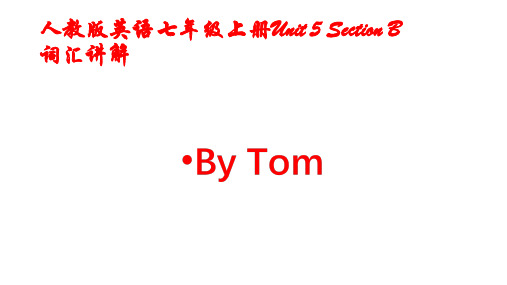
• 我对这本有趣的书感兴趣。
部分形容词有-ing 和-ed 两种形式
• 部分形容词有-ing 和-ed 两种形式,表示的意义不同。 • -ing形式通常指事物本身的性质,意为“令人……的”, • -ed形式通常指人的感受,意为“感到……的”。
• e.g. We are in different classes. 我们在不同的班级。 • This iPad is different from that one. 这个iPad 和那个不同。
love /lʌv/ v.& n. 爱,喜爱
• love 作v. 后常跟名词、代词、动词不定式或动词的-ing 形式。 • e.g. I love my grandpa so much. 我非常爱我的爷爷。
• He is like his father.他像他父亲。
with /wɪð, wɪθ/ prep. 和……在一起;带有; 使用
• with用法例句 •❶和……在一起 • Mike is playing games with his sister. • 迈克正在和他的姐姐一起玩游戏。 •❷带有 • I have a house with three rooms. • 我有一座带有三个房间的房子。 •❸使用 • I write “TFBOYS” with a pen. • 我用钢笔写“TFBOYS”。
same 的反义词是different
• same 的反义词是different,意为“不同的”,其后的可数名词应是复数 形式。常见结构be different from 意为“与……不同”。 • the same as 与……相同 • ↓反义词 • be different from 与……不同
七年级英语上册第五单元第三课时
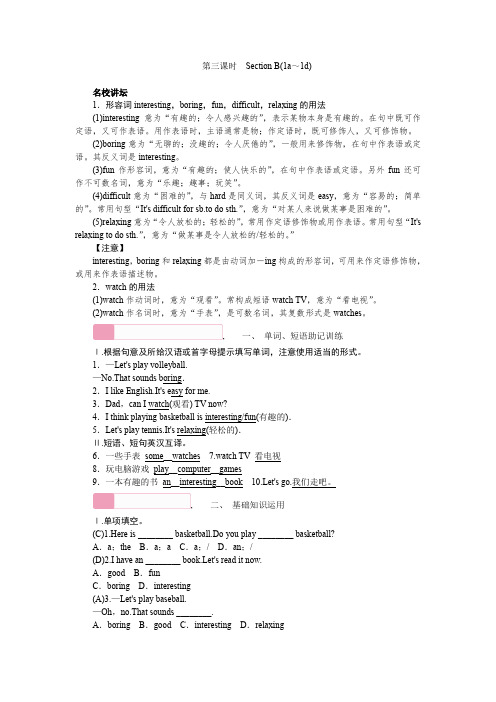
第三课时Section B(1a~1d)名校讲坛1.形容词interesting,boring,fun,difficult,relaxing的用法(1)interesting意为“有趣的;令人感兴趣的”,表示某物本身是有趣的。
在句中既可作定语,又可作表语。
用作表语时,主语通常是物;作定语时,既可修饰人,又可修饰物。
(2)boring意为“无聊的;没趣的;令人厌倦的”,一般用来修饰物,在句中作表语或定语。
其反义词是interesting。
(3)fun作形容词,意为“有趣的;使人快乐的”,在句中作表语或定语。
另外fun还可作不可数名词,意为“乐趣;趣事;玩笑”。
(4)difficult意为“困难的”,与hard是同义词,其反义词是easy,意为“容易的;简单的”。
常用句型“It's difficult for sb.to do sth.”,意为“对某人来说做某事是困难的”。
(5)relaxing意为“令人放松的;轻松的”,常用作定语修饰物或用作表语。
常用句型“It's relaxing to do sth.”,意为“做某事是令人放松的/轻松的。
”【注意】interesting,boring和relaxing都是由动词加-ing构成的形容词,可用来作定语修饰物,或用来作表语描述物。
2.watch的用法(1)watch作动词时,意为“观看”。
常构成短语watch TV,意为“看电视”。
(2)watch作名词时,意为“手表”,是可数名词,其复数形式是watches。
,一、单词、短语助记训练Ⅰ.根据句意及所给汉语或首字母提示填写单词,注意使用适当的形式。
1.—Let's play volleyball.—No.That sounds boring.2.I like English.It's easy for me.3.Dad,can I watch(观看) TV now?4.I think playing basketball is interesting/fun(有趣的).5.Let's play tennis.It's relaxing(轻松的).Ⅱ.短语、短句英汉互译。
- 1、下载文档前请自行甄别文档内容的完整性,平台不提供额外的编辑、内容补充、找答案等附加服务。
- 2、"仅部分预览"的文档,不可在线预览部分如存在完整性等问题,可反馈申请退款(可完整预览的文档不适用该条件!)。
- 3、如文档侵犯您的权益,请联系客服反馈,我们会尽快为您处理(人工客服工作时间:9:00-18:30)。
Section B
教学目标
知识与能力
Section B的主要内容是学会使用描述性形容词,复习和巩固所学的知识,并学会运用所学知识进行写作(行为动词一般现在时的肯定句、否定句和一般疑问句)。
过程与方法运用Classifying的学习策略,引导学生进行听力和口语交际训练,学会使用do和does引导的一般疑问句,学会用Let’s…提建议,并能够谈论自己喜欢哪些球类运动、不喜欢哪些球类运动及其原因,能够谈论怎样和自己的朋友度过一段愉快的时光,同时也进行适当的阅读和写作练习(主要是组词、造句)。
情感态度价值观
该部分学习内容主要是谈论自己喜欢哪些球类运动,不喜欢哪些球类运动及其原因,符合学生喜爱运动的心理,同时通过谈论怎样和自己的朋友度过一段愉快的时光,培养同学之间和睦相处,互相帮助,团结友爱的精神。
教学重、难点及教学突破
重点
学习使用描述性形容词:interesting,boring,fun,difficult,relaxing:复习do/does引导的一般疑问句和let’s…句型;复习名词的复数构成与使用。
语法难点
行为动词一般现在时的肯定句、否定句的结构,尤其是单三形式的变化。
教学突破
复习和巩固所学的行为动词一般现在时的结构,引导学生进行一些阅读和写作的练习,对强化记忆有很大的帮助。
教学准备
教师准备
设计学生常见的球类运动和其它活动的教学幻灯片,图片或制作反映各种运动活动的课件;设计课后巩固练习的幻灯片。
学生准备
通过询问老师、同学或上网查询的方式了解各种运动的竞赛方法;调查同学、朋友或家人所喜欢的运动项目及其原因。
教学步骤
(1课时)
一、第一教学环节:情景创设,导入新课
二、第二教学环节:师生互动。
学习探究
三、第三教学环节:合作交流,巩固提高
本课总结
本课内容主要学习使用描述性形容词:interesting,boring,fun,difficult,relaxing;
复习do/does引导的一般疑问句和let’s…句型;复习名词的复数构成与使用。
正确掌握行为动词一般现在时的肯定句、否定句的结构,尤其是单三形式的变化,并进行阅读和写作的练习。
板书设计
Unit 5 Do you have a soccer ball?
Section B
Words: interesting, boring, fun, difficult, relaxing
play volleyball /basketball, watch TV, a sports collection, every day
have→has, but →and, only, them→they
Sentences: Let’s play computer games. That sounds interesting.
Grammar: 行为动词一般现在时的肯定句、否定句构成:
He has 7 tennis rackets. He doesn’t play sports.
问题探究与拓展活动
Let’s祈使句的构成和用法:基本构成是Let+someone+d o something.,意思是“让某人做某事”,表示“征求意见或提出建议”。
如:Let’s play basketball.让我们打篮球吧。
,It’s time for class.Let’s g o t o the c lass r oom.上课了,让我们去教室吧。
实践活动,做调查:调查学生喜欢什么球类运动?不喜欢什么球类运动?为什么?在活动开展之前,教师要在黑板上画一个表完成,即让学生自己说出喜欢什么,不喜欢什么,最后说出理由。
教师可将学生的答案填在表格中,再进行归类。
这种活动可使同学们学会表示描述性形容词的用法。
练习设计
随堂练习设计
仔细观察下表中各句的规律,选用have,do的适当形式填空。
KEY S:1.have;do;don’t 2.Does;have;does;doesn’t 3.Do;have;have 4.Does;has 5.have;have 6.have;don’t
个性练习设计
谈论自己在体育方面的爱好、兴趣及原因:无论是男生还是女生,对体育的爱好是一种共性,但每个人的爱好是不相同的。
让学生谈论自己在体育方面的爱好、兴趣是他们愿意做的事情,进一步要求学生说出自己对某项运动感兴趣的原因。
学生可以这样介绍:I like basketball.I have a basketball.I like it,because it’s interesting.。
这种活动可以帮助学生更好地使用描述性形容词,也可以了解和掌握学生在体育方面的爱好。
